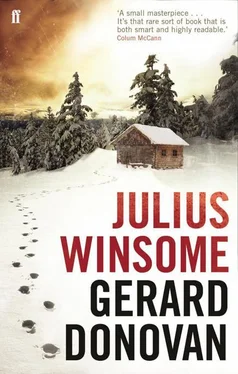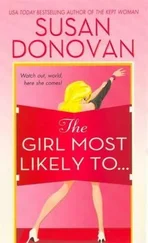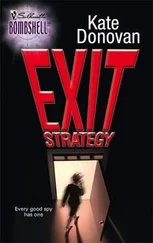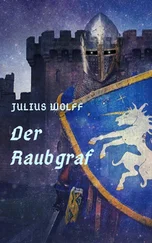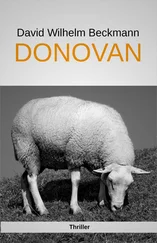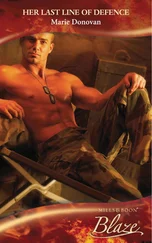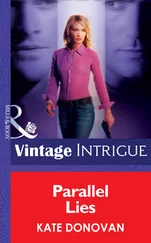Looks like weather coming, she said, stepping to the curb.
Yes, I said. That it does.
The store window had about twenty televisions on all the shelves, it seemed to me, and each one had a different channel showing, flashing images of bodies behind me in the corner of my eye, people dancing, singing, talking, with holiday lights already draped on the televisions, flashing too, with signs saying that there were only seven short weeks to Christmas. Even though the sound was turned down they did all the talking for us, because we said nothing to each other for a while as people walked by. A flurry of white swept the street and was gone like a lighthouse beam.
I didn’t want to be staring at her, so I gave a quick glance. Her hair was different, more curly. It was better when it was straight, suited her bone structure that way. After some time passed with us standing there she said,
Julius, I’m so sorry.
For what then?
For everything. She kissed me all of a sudden and said, Be careful.
Of what then?
I don’t know. I often think of you alone up there. Just a feeling.
Another gust blew the lights sideways on the tree, a colder wind, bringing snow for sure. I wondered about that comment of hers. Then we both said nothing again for some seconds. I’m not good at saying goodbye, especially if it’s forever. I don’t know, I felt a frozen wind blow around her as if encasing her in stone, or maybe it was just going around her and heading straight for me.
How’s Hobbes? she said
He’s fine.
What was the point in making her sad? Sharing my own sadness would not make it less, only double it.
You know I love that dog.
I know. He’s fine.
A man joined us, he was dressed in a constable’s uniform, and he slotted himself at her side without looking at me.
Hi, Honey.
He kissed her and hugged her close to him. I watched something above her head that wasn’t there just to put my eyes somewhere. She smiled and nestled her head on his shoulder. He smooched her hair, stroked it. The television danced behind me, the boxes this time, not the people in them. They were yelling at me to go home and be away from this town.
Let’s go, he said to her. It’s getting late. Remember we’ve got friends coming over for drinks.
He still didn’t look at me.
Troy, this is Julius, she said.
He turned his head and stared, empty, mouth hard, gave a nod only a marksman could have observed. I held out my hand but he was already sheparding her away.
I heard him say after only a few steps, Don’t tell me that’s the guy.
Shhh, she said.
You went out with him ? What were you thinking?
Shut up, will you, Troy? He’s got good hearing.
He said something else while they crossed the road, I could tell by his lips and the waving he was doing.
I continued on, a short walk the rest of the way to the supermarket. People tumbling out with shopping in the rush hour, cars dusted with flakes pulling up and flashing people who waited with groceries on the pavement outside. I glanced at the poster to make sure it was still there. Yes, and not only that, someone had written across it in a heavy pen, “People are more important than dogs!!! Feed the people this Christmas!!” I ripped it off the wall and a couple moved aside to give me room as I tore it into strips and stuffed the shreds into my coat pocket. Fine, I’m done with posters now. No more writing.
I drove home under the festival lights of Fort Kent and on into the night where there were no lights but the stars, and none were out that evening, or they were but strung out over low cloud, the type of cloud that races across the skyline at twilight, races with the smells of the earth and of the air, pushing the air in front of it, cold air.
Night fell as I cut through the countryside. When the headlights scoured out the dirt lane to the cabin I thought I saw Hobbes run up to them, as he was always doing, running out of the night and across the lights, sniffing the bags after I brought them into the kitchen and put them on the floor, looking for his treat.
Now, driving in the dark, I summoned my boyhood friend Shakespeare and tried another sentence: “My stomach was in a coil when that man hugged Claire. He had some color about his face, the way he ignored me.”
* * *
After she left me I had gotten to love that dog. He always greeted me when I returned home. For the rest of that summer he ran from his spot in the hot woodpile, from his walks in the woods, where he went for solitude or whatever drives them there, ran to see me after my landscaping work, ran to greet me when I was happy, ran to greet me when I was unhappy, ran to greet me when I was distracted, vague, thoughtful. When my hands gripped the steering wheel or lay loose as the truck rumbled up the dirt road, lurching with shovels and picks or unencumbered, he ran to greet me. Dogs know only loyalty and find their own lives inside it.
And they know when you’re not right, they’ll sniff the disease in you, the low light in your blood, and put their mouths there, be it your kidney or your arm—and they’ll stick by you until you’re okay. Find me a human who’ll do that. They bark a certain way and it means certain things: you have to hear the tones and the length and how he places his head and what his tail is doing. They don’t have words so they use their whole bodies to make words. Sound and head angle and tail and what not. They talk with their whole body. People use their bodies not to talk, hands in front of mouths, turning sideways, never listening. They put fear in their dogs. You want to know the man, look at his dog.
And when I thought he was running up to me, I thought a miracle was mine, some strangeness in the woods had produced him back, my Hobbes, the terrier, an early Christmas gift for Julius Winsome. I would have a fire on in no time, find a treat or drive him to Fort Kent with the heater on and the window open so he could stick his head out and still be warm. That would be just the start.
But when I parked the truck with the lights shining on the flowerbeds, the grave was undisturbed.
THURSDAY NIGHT THE SNOW FELL.
The wind stopped and the temperature went up slightly, I could tell from the drafts and the silent sweep of powder that shook itself across the fields, the woods, the cabin roof, and across and along the rest of Maine it seemed. But for the trees the wind would strike the cabin directly.
There is a day, an hour when winter comes, the second it slips in the door with its weather and says, I am here. If snow falls early enough, it drifts down into red forests and piles along lakes ringed with blue ice, but the visit is temporary: the white handprint of north vanishes with the next sunny day, polished off the hills and trees of Maine by the cloth of sunshine, the blow of warm fall breath on wood. If late, winter arrives on the back of a windstorm that blows every color before it but white, while under it, lakes turn to frozen spit and bare trees split, cracked open, and the forests stretch up to the shivering lit skin of the northern lights.
Maine, the white star that burns from November, it rules a cold corner of sky. Here, only short sentences and long thoughts can survive: unless you’re made of north and given to long spells alone, don’t trespass here from then. Distances collapse, time is thrown out. Children skate their names on ponds, sleds drag dogs in front of them. People defeat the winter by reading out the nights, spinning pages a hundred times faster than a day turns, small cogs revolving a larger one through all those months. The winter is fifty books long and fixes you to silence like a pinned insect; your sentences fold themselves into single words, the hand of twelve makes one hand of time. Every glance ends in snow. Every footstep sinks North. That’s time in Maine, the white of time.
Читать дальше
